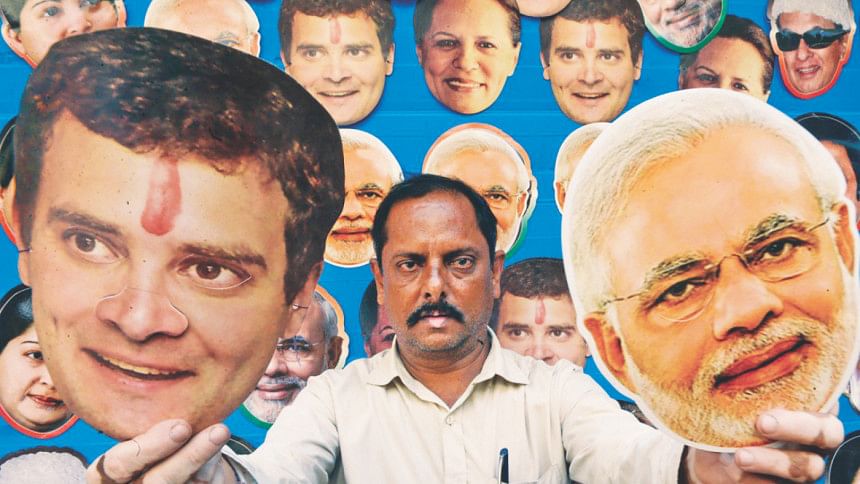The Massacre of Norms

As India’s marathon elections enter their penultimate phase, the nation may be getting weary of the apparently never-ending campaign. But as in a test match, there is never a dull moment. The politicians are still at it, barnstorming the countryside to convince the many voters who still may not have made up their minds, why they’re better than their rivals. But just as tired batsmen hit wayward shots, some politicians have let go off their inhibitions, hitting inelegant strokes which are caught at the boundary, but the umpire is too intimidated to object, and part of the stadium is so vociferous in demanding a six, that those who want to uphold higher standards and see replays end up shaking their heads in despair as the umpire grants the batsman six more runs.
Whether or not anything illegal may have occurred, politicians, in particular leaders of the Bharatiya Janata Party (BJP), have disregarded norms with a callousness that has taken Indian politics to a new low. India does have a model code of conduct to regulate the behaviour of candidates during electioneering, and it imposes penalties for violations. The code governs what candidates can say about each other and the promises they make. But the way the commission has been ruling lately on contentious matters has baffled many people.
In an attempt to appear even, the election commissioners have been issuing warnings to candidates from most major parties, but like that timid umpire in thevillage cricket match who has to decide if the emperor is run out or not, the commissionhas given rulings that have allowed the emperor to keep batting. So Prime Minister Narendra Modi has been able to invoke the memory of paramilitary forces killed during the February terrorist attack in Kashmir, and ask voters to vote in the name of ‘the martyrs’—essentially arguing that a vote for his party alone would honour the fallen, and the commission finds nothing objectionable. But it does reprimand the Uttar Pradesh chief minister Ajay Singh Bisht, who calls himself Yogi Adityanath, after he called the Indian Army ‘Modi Sena’. There’s one rule for the satrap, another for the sultan.
Unrestrained and emboldened, Modi took the electoral discourse to lower depths in early May, when he called his rival Rahul Gandhi’s father and former prime minister Rajiv Gandhi, a man whose “life ended as corrupt #1.” Calling Rajiv Gandhi corrupt may be seen as part of a bitter election campaign, but Rajiv was assassinated by a terrorist in 1991, so the reference to the end of his life was crass. In any case, Gandhi was neither tried nor convicted of corruption, although he was accused of it during his lifetime, and his party, the Congress, even lost the 1989 parliamentary elections.
There was irony too. Only eight months ago, on his 74th birth anniversary, Modi had praised Rajiv’s contribution to Indian politics. In a remarkably candid statement to a fawning interviewer (and you get to interview Modi only if you are willing to be fawning), Modi had said that his only rival is Narendra Modi. Juxtapose the two statements: in one, Modi praised Rajiv in August, and a bit more than eight months later, he brought up his death in a crude way—remember, Rajiv was blown up by a suicide bomber. It showed those two rival Modis battling in his mind.

Such invective is usually associated with the presidents of the US and the Philippines—Donald Trump and Rodrigo Duterte. Modi is now firmly a member of that club. Unsurprisingly, Modi’s supporters, who affix the term chowkidar (or security guard) in front of their names on social media, chipped in gleefully, arguing that Rajiv Gandhi was corrupt—probably forgetting that neither he, nor Jawaharlal Nehru, (whom Modi blames frequently in his speeches), is a candidate in this year’s election, since both have been dead for quite some time now—more than a few decades. Such is the moral abyss where Modi has brought India’s political discourse.
It is hard to predict any electoral outcome, and particularly in a nation as polyglot as India, with hundreds of regional, national, and local considerations affecting and influencing voters’ choices. But the tone of Modi’s own rhetoric, and that of the BJP president, Amit Shah (who has called Bangladeshi migrants ‘termites’ and ‘infiltrators’), suggests that things are probably not going according to their plans. That alone can explain why Modi is fighting the election as if he is a desperate opposition leader seeking public office for the first time.
During the 2014 elections, he presented a different personality. At that time, when a few Hindu fundamentalist leaders spoke out of turn and raised divisive, communal issues, Modi blew the whistle and said the election was about vikas, or development, and ordered his candidates to stay on message. Five years on it is a different story. One reason is that Indians haven’t seen much vikas. The economy has not grown as rapidly as Modi had promised or the voters expected. And the two actions he is known for have been spectacular self-goals. One is the so-called demonetisation, whereby 86 percent of India’s currency was withdrawn without adequate warning or preparation, claiming it would root out black money and stop terrorism (and neither has happened). Instead, it drained liquidity from the economy and disproportionately hurt the poor. And the other is a cumbersome and complicated goods and services tax that has annoyed and irritated businesses, big and small. On top of that, there is an agrarian crisis and rising unemployment, which has left Modi with only one option: to whip up communal passions. There has been some growth in that area—a sharp spike in the number of people lynched according to a recent Human Rights Watch report. The database maintained by the website IndiaSpend shows that in the three years preceding Modi’s election, 14 people were killed across India in six incidents; in the five years since there have been 121 incidents in which 281 people have died, a large majority of them being Muslim, Dalit, or Adivasi.
And you see that in hilarious remarks, straight out of a loud jatra play: Parliamentarian Sakshi Maharaj has threatened to curse those who don’t vote for him. Then there is the self-described ascetic Pragya Singh Thakur, a terror suspect out on bail ostensibly on health grounds, who has nonetheless been nominated to be a BJP candidate almost as if to spite those who warn of “Hindu terror.” Thakur has said that she had ‘cursed’ a senior police officer who had investigated her case (and who later died in the line of duty, killed by terrorists during the November 2008 attacks in Mumbai). Thakur has also claimed that her cancer had been cured because she drank cow urine (reports say she has undergone mastectomy). Such remarks perpetuate blind faith and are irresponsible.
Indian politics has always had colourful characters, even criminals standing for elections, but rarely has the political campaigning been so coarse, and rarer still has its vulgarity been defended so vigorously by party officials and supporters. Hatred has been normalised. The Overton Window—what is acceptable in a public discourse—has stretched significantly in India, and the BJP’s politicians in particular have continued pushing the limits.
Congress leader Rahul Gandhi has tried maintaining the focus of his campaign on the rural distress, joblessness, and corruption, and even offered a quasi-universal basic income scheme to assist India’s poorest. But acknowledging the rightward shift in Indian politics, he, and other senior party leaders, including his sister Priyanka Gandhi Vadra, former ministers Shashi Tharoor and Digvijay Singh, and Madhya Pradesh chief minister Kamal Nath, have all been saying or doing things that show them being devout Hindus. Their beliefs should be a private matter, but for Congress leaders to exhibit their Hindu piety is a relatively new phenomenon. It must be said, however, that Congress politicians from Indira Gandhi’s time have taken part in elaborate Hindu rituals in the past. The difference though is that those leaders did not assertively describe their faith, nor did they cloak their identities in religious terms. But the BJP has succeeded in creating the impression that Congress Party does not like Hindus (and instead appeases minorities), forcing the Congress leaders to righteously assert is leaders’ Hindu identity, including a weird discussion about the kind of brahmin Rahul Gandhi is—or isn’t.
This shift in the discourse, to a baser, meaner, and lower level than in the past, will take years to undo. It has also moved the centre to the right. But this is not the economic right, of free enterprise and freedom to trade and invest and widening economic opportunities for all. This is a socio-religious right, which infringes personal freedoms and boxes individuals and groups into narrower identities. Despite some noteworthy elements defending civil liberties in its manifesto, the Congress is reluctant to embrace liberalism more actively. It has dropped the ball in defending women’s right to equality and upholding the Supreme Court unequivocally in the Sabarimala controversy, where orthodox Hindus in the southern state of Kerala want to prevent women from entering a temple. And while India in 2019 is more open for business than at independence in 1947, the paradigm shift occurred in 1991, when Prime Minister Narasimha Rao and his finance minister Manmohan Singh liberalised Indian economy when the Congress was in power; the process did not begin with Modi’s election in 2014.
To counter the climate of hatred, Rahul Gandhi has spoken movingly of love as his weapon of choice. He speaks of compassion and concern. But his calm message gets drowned, if heard at all. As a foreign correspondent noted while observing the campaign, the Indian broadcast media is awash with images of Modi and his campaign. Channel after channel covers the election as though he is the only candidate, making much of the Indian news media, including in particular the private broadcasters, look like propaganda arms of the government. Most television networks act as if they have no obligation to grant equal access to all parties or to cover issues objectively. With social media—in particular WhatsApp and Twitter—being used extremely effectively by the BJP’s machine to hammer specific messages and attack government critics, the playing field is anything but level.
Conventional wisdom among political pundits is that Modi will return to power. Indian voters have the remarkable ability of making pollsters look foolish. And making predictions of election outcomes—particularly for a society as heterogenous as India’s—is an indicator of hubris, so I won’t go there. But one question remains: if indeed there is a Modi wave, and if indeed the BJP is going to get an absolute majority, why is the party running such an abusive campaign, and why do its leaders sound so desperate?
Salil Tripathi is a writer based in London, and the author of The Colonel Who Would Not Repent: The Bangladesh War and its Unquiet Legacy. He is contributing editor at The Caravan and Mint in India, and writes for publications around the world.

 For all latest news, follow The Daily Star's Google News channel.
For all latest news, follow The Daily Star's Google News channel. 



Comments